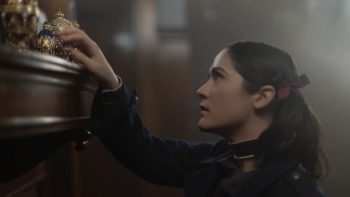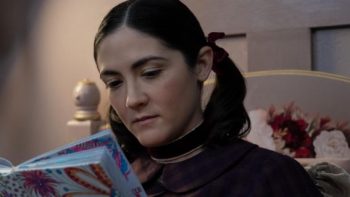Orphan: First Kill: Film Review Dir: William Brent Bell
Orphan: First Kill is a bland, psychological horror film and prequel to 2009’s Orphan that feels as stimulating and satisfying as eating melted vanilla ice cream with your fingers.
Starring: Isabelle Fuhrman, Kennedy Irwin, Julia Stile, Rossif Sutherland, Hiro Kanagawa
Orphan: First Kill is another sequel/prequel/weakquel that mysteriously appeared on my list of upcoming films in the past few months and roused my interest for three forgettable seconds before my brain started to work again and I wondered why it was being made.
 I’d take a stab in the dark and say it’s because the original was a decent hit on its modest $20m budget (making around $80m worldwide) and now with a budget of $2m the studio wanted to try and hurriedly slap together a sequel that wouldn’t give anyone the time to look into it more and would hopefully repeat the money teat magic trick of the original.
I’d take a stab in the dark and say it’s because the original was a decent hit on its modest $20m budget (making around $80m worldwide) and now with a budget of $2m the studio wanted to try and hurriedly slap together a sequel that wouldn’t give anyone the time to look into it more and would hopefully repeat the money teat magic trick of the original.
I’d say that because it’s directed by William Brent Bell, who started out strong in his directing career with two low-budget cult-status films in Stay Alive and The Devil Inside (2006 and 2012 respectively) and hasn’t quite managed to recapture those early, hungry years of horror since.
 I’d also say that’s because the film is absolutely dull as dishwater, somehow perpetually drenched in a washed-out grey haze that makes the interior lights of a dark cinema look more colourful and vibrant, and features none of the reasons the original succeeded: an 11-year-old who can act like a 30-year-old, a talented older cast that earnestly commits to the part, decent writing, and enough overall talent and skill to suspend an audience’s disbelief for more than a fraction of a second.
I’d also say that’s because the film is absolutely dull as dishwater, somehow perpetually drenched in a washed-out grey haze that makes the interior lights of a dark cinema look more colourful and vibrant, and features none of the reasons the original succeeded: an 11-year-old who can act like a 30-year-old, a talented older cast that earnestly commits to the part, decent writing, and enough overall talent and skill to suspend an audience’s disbelief for more than a fraction of a second.
Instead, the film is (I guess?) an exercise in how to make a 25-year-old grown woman look 6 inches shorter than she is and 16 years younger without the use of any special effects other than putting her head at the bottom of a frame and using a laughably noticeable stunt double that switches between shots in an unavoidably jarring way.
It also crams a tastelessly unoriginal story and awful characters into its 99-minutes with more greasy cheese than an overfilled toastie, and requires the same kind of mental gymnastics for enjoyment as you’d have to have in trying to eat one. So let’s dig right in.
Orphan: First Kill opens in Estonia in 2007 where our little psychopath Leena manages to escape using her old tricks of seducing grown men and somehow having the diabolical foresight of Jim Moriarty. Leena has hypopituitarism – a growth hormone deficiency that perpetually keeps her looking like a tiny child.
But Hypopituitarism also has common effects in adults which include fatigue, muscle weakness, and lack of ambition, thankfully none of which Leena has because she’s an absolute beast of a woman, beating the life out of anyone she comes in contact with, somehow.
She murders an overly trusting and oblivious psychiatrist in her home and then plays some piano before scanning the Internet for missing children and finding a girl called Esther Albright who luckily passes as her doppelganger. She dons her signature Lolita-meets-Annabelle-Doll outfit and then sits on a swing until a policeman arrives in the middle of the night and convinces him she’s the missing girl from America.
The Albright family is notified, and Tricia Albright (Julia Stiles) travels to collect her from Russia. They’re greeted at the airport by Tricia’s husband Allen (Rossif Sutherland) and son Gunnar (Matthew Finlan) who share the most fleeting and unemotional of reunions before they all decide to go home and pretend to play happy families.
Leena/Esther manages to avoid having her fingerprints, or a blood sample, or anything of any quantifiable identification being taken because the script pretends it wouldn’t happen, and then we’re off to the races with an inaccurate reference to Rodin’s The Thinker and a handful of ‘oh that was in the original!’ moments that do nothing for the story but offer weak fan service.
When Esther’s lie is almost exposed by the near-silent-except-when-it’s-most-important Inspector Donnan (Hiro Kanagawa), the film shifts gears into a truly weird collection of dialogue and motivations, rendering everyone in the family utterly unlikeable or passively stupid, until the film crawls toward its inevitable conclusion that we know of because of the first film.
If you, like me, were hoping that there might be some super double-triple twist in the film because this family is called The Albrights and not The Sullivans (as they were referred to in the original film), then abandon all your hopes now because I’m pretty sure they just forgot about that part entirely. The film ends, we get a pale imitation of the final shot of Psycho, and the credits blissfully free you from the shackles of tedium in a blaze of UV neon paint.
On the plus side, I do see this film having a second life as a cult drinking game, where every time you notice a stunt double being used or Esther acting like a 25-year-old woman instead of a 9-year-old girl, you take a shot until your own vision becomes as hazy as the constant fog drifting over every scene.
However, while it would certainly be the only potentially entertaining thing capable of coming from this film, I worry that would be akin to promoting alcohol poisoning, and might make you pass out so early into the film that you’d tragically consider rewatching it so see if you missed anything at all.
Oxford Lamoureaux
- The Dead South – Powerstation: April 5, 2024 (Concert Review) - April 6, 2024
- Queens of The Stone Age – Spark Arena: February 29, 2024 (Concert Review) - March 1, 2024
- Dune: Part Two – Dir: Denis Villeneuve (Film Review) - February 29, 2024
